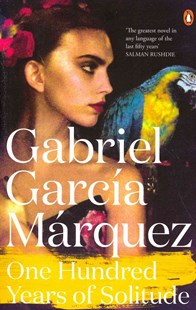One Hundred Years of Solitude by Gabriel García Márquez
Many years later, as he faced the firing squad, Colonel Aureliano Buendía was to remember that distant afternoon when his father took him to discover ice
— Gabriel García Márquez

I picked this novel up at the same time as I picked up Breakfast of Champions, on a whim because it was sitting on the same library cart. The story follows six generations of the Buendía family in Columbia, whose patriarch, José Arcadio Buendía, founds the town of Macondo with his wife Úrsula on the banks of a river. The book is written in a style of magical realism, and is considered an exemplary novel of the genre.
I must admit there were parts of this book where my attention waned, and the flood of details and exploration of characters, both primary and secondary, almost drowned me. I was not always engaged, and I almost didn’t make it through the first half. A lot of what is described is the mundane details of the townspeople’s and the Buendía family’s routine as it goes unbroken until something happens to shake it up. But withstanding this deluge, as the citizens of Macondo later do, I found a rich and compelling story where I was privy to the Buendía’s greatest triumphs and harshest trials, against the backdrop of Macondo. The town itself is at times wealthy and bustling, and at others rotting with decay and ruin.
Once you read through the exploits of two generations of Buendías, you begin to realize that one of the central themes of the book is the cyclical nature of time, and that the Buendías are doomed to repeat their mistakes across generations. This is compounded through the repetition of character names. There are several Aurelianos, José Arcadios, and Remedioses in the book, so when more than one generation is alive at once it can become confusing, especially when the characters have similar beginnings and ends. There are also several “lynchpin” characters that survive to be over one hundred hears old, that are involved in the cycle of events more than once, and can recognize these patterns.
The characters in this novel were beautifully written, though some were truly awful people, and it was frustrating to read along as they fucked up their own lives or their children’s lives so badly. Through neglect, spurned love, isolation, emotional abuse, incestuous relationships, and insanity, the Buendía family constantly destroys itself from within. This is mirrored later in the book by the red ants and termites that later come to infest, consume, and destroy their ancestral home. These qualities make all of the characters so decidedly human that it is difficult not to empathise with them at some level, even though their actions are sometimes abhorrent.
Throughout all of this there are high points of stirring rebellion, passionate love, and a drive for creation and invention that often leads to a fountain of wealth or production that brings the Buendías and the town of Macondo out of the muck and into prosperity again. Though as more lynchpin characters grow old and die, the further the family and the house fall into disrepair, as the loop of their family line gets tighter and tighter.
I may go back to this book when I am older, as I feel the keen edge of old age and solitude a little more. Perhaps then I can understand another theme that Márquez lays out throughout the text; the theme of solitude. Many characters become comfortable with their own solitude, and spend much of the book coming to terms with that feeling of being alone in the world. Some force it upon themselves, though others are forced there through old age or neglect, insanity, and even their own family.
The magic and mystery of Macondo has at the beginning of the novel, when José Arcadio Buendía takes his sons Aureliano and José Arcadio to see the inventions of the passing gypsies is wonderful. Seemingly on an island floating separate from the world in some other dimension, Macondo attracts all kinds of strange travellers, and harbours secrets like the grounded shipwreck of a Spanish galleon. Though as time passes, Macondo is opened to the world, and the magic gradually fades, your heart begins to feel heavy with the weight of the Buendía family’s troubles. The magic always remains in the background, just hidden and out of sight behind flickering ghosts, there but only if you could reach out and touch it.
One Hundred Years of Solitude is a book about life. In many ways it reminds me of Six Feet Under, which made me ugly-cry hard at the end of its series finale. This is the first novel I’ve read by a Latin American author, and after this strong example I am very much looking forward to reading more.